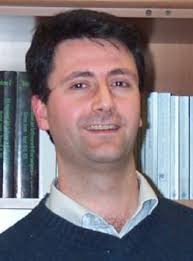On November 21st, 2006, after a 3-year long and hopeless fight against a rare form of cancer,
Prof. Marco Cadoli left us.
Marco died on November 21st, 2006 after a 3-year long and hopeless fight against a rare form of cancer known as mesothelioma. He was only 40 years old and left behind his wonderful family: his wife Laura and the two young children Andrea and Riccardo.
The community lost a brilliant scientist, many of us a dear friend, and everyone an extraordinary man.
Despite his young age, Marco was a well-known and very appreciated researcher in AI.
He wrote his Master's thesis in computer engineering at the Sapienza University of Roma under the supervision of Maurizio Lenzerini. His work won two important (best Master's thesis) awards, it was presented at AAAI in 1990 with the title “The Complexity of Closed World Reasoning and Circumscription,” and then published in JCSS as a full paper.
Maurizio Lenzerini immediately recognized the exceptional research potential of Marco and encouraged him to pursue a Ph.D. degree. His thesis “Tractable Reasoning in Artificial Intelligence” was to-date the most comprehensive work on computational aspects of Knowledge Representation formalisms and has been published by Springer as a monograph in the LNCS series.
Marco was an outstanding and prolific researcher with many interests; his scientific production covered many areas of artificial intelligence including:
- Reasoning: Algorithms and complexity,
- Knowledge compilation,
- Approximate reasoning,
- Constraint modelling and reformulation, constraint programming,
- Quantified boolean formulae, quantified constraints,
- Agents and negotiation,
- Abstraction,
- Data and knowledge bases,
- Software engineering, and
- Theoretical computer science.
He published over 80 papers in the most important journals and conferences. His work on computational complexity of knowledge representation formalisms, approximate reasoning, knowledge compilation, QBF, and constraint modelling and reformulation has certainly been a source of inspiration for many researchers.
Marco's approach to science was extraordinary: I rarely have seen a so absolute impartiality and open-mindedness, willingness to discuss, compare and accept other's viewpoints without any intellectual prejudice, and a so high capability to see even ordinary problems from unusual perspectives. Such qualities made working daily with him an extremely precious experience.
Marco was also an appreciated teacher. Teaching for him was important, and he took this activity very seriously. Marco maintained lecture notes and other material useful for his students until the very end (his web site was last updated on November 6th, 2006—just two weeks before his death!). His students loved him as a teacher. And I am sure they miss him.
I also met Marco during my studies, and asked him to supervise my Master's thesis work.
That was the beginning of a wonderful professional and human experience, which continued with my Ph.D. and after that.
During these years, I had the opportunity to come to know Marco very well and to deeply appreciate his scientific and human qualities. I had the responsibility and the honor to work with him daily and to become his friend, and the devastating sadness to share his pain and to accompany him to his destiny.
Marco was extraordinary not only at work. I will never forget how, when preparing papers to submit to conferences, he always avoided to rush until night, inducing me to do the same: “That's enough for today, I must go home to play with my children, now”, he would say at 6pm even on the very last days…
But the most important teaching he gave me was during his hopeless illness: Marco continued to work almost without interruption: how many times he gave lectures the days immediately after his chemotherapy, and, later, how many afternoons we spent working together at the hospital!
During all that time he never rebelled against his destiny: “I just do what I can,” he would say, referring to the fact that winning against his form of cancer was out of any human capabilities.
I met with Marco for the last time a few days before his death, at his house.
I clearly read in his eyes that he was at the very end, but when asked, “How are you?” he answered with a smile: “Very well, I'm at home with my family, and friends come to visit”.
But he surprised me even more: he was unusually lucid that day, I guess because he intentionally reduced his dose of morphine to be able to clearly talk with me, even at the cost of much stronger pains. We spoke intensively and for hours about the future: not his future, but that of his current Ph.D. students… and mine.
This was on Marco's mind in the few days before the end; this was my Teacher.
Thank you Marco.
Toni Mancini
Dipartimento di Informatica e Sistemistica
Università di Roma “La Sapienza”
August 2007
